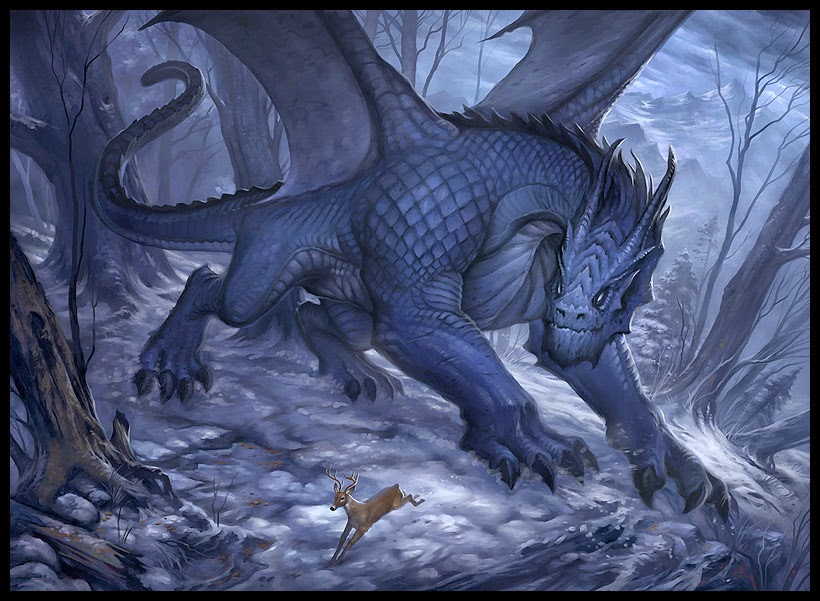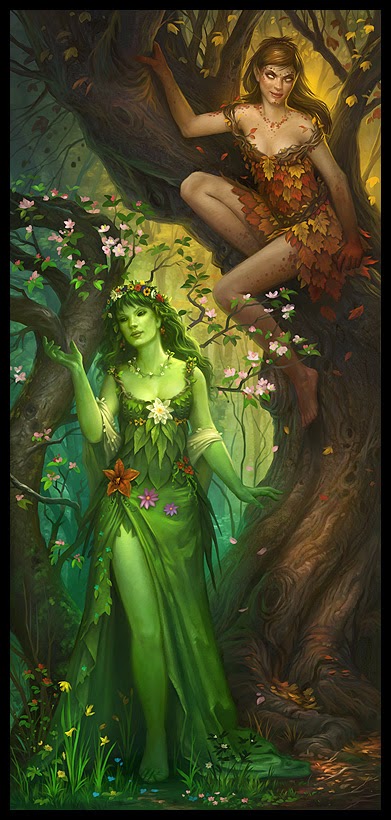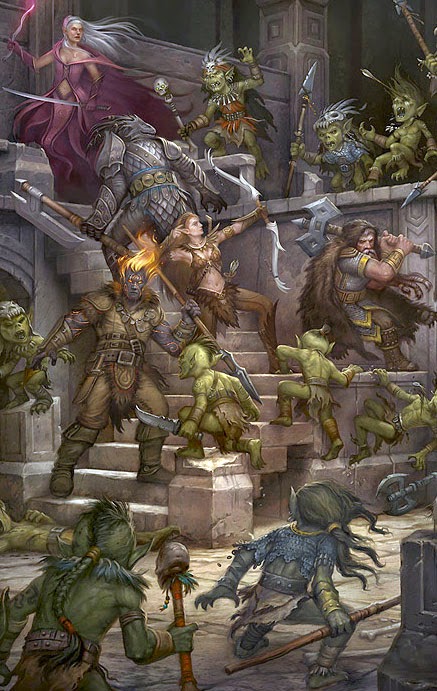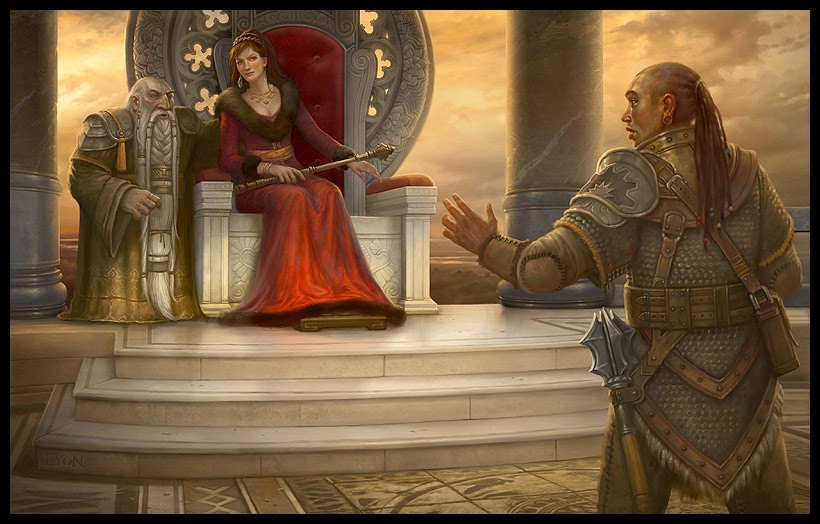 |
| Sigil |
Public D&D Games
I started this blog for a number of reasons. The main one was to discuss running games in a public setting. I've been running D&D in a game store since 2008 and I have been running D&D Encounters since the very first season (Halaster's Lost Apprentice).
I saw that Jason Denton wrote an article on the Adventurers League site called "This Is Not Your Home Brew Game". It is a very well-written article with an interesting viewpoint. Jason talks about how Adventurer's League games are intended to be run, and I was struck by a number of comments he made. Some of the things he says contrasts very sharply with my own experiences.
I can say that our store has a solid base of about 25-30 players who show up every week, and it's been like that for quite a few months now. Prior to that, we had a single table. 5th edition has been a big hit here in New York.
Tooling With Characters
Denton says:
"Home brew games follow the ongoing adventures of a single party, but organized play is the episodic adventures of a rotating cast. "
He goes on:
"In a home game, you only get to play one character. But if you play Adventurers League games on a regular basis, you will quickly find that you need multiple characters as adventures repeat. Take the opportunity to play unusual characters. Rotate through them, and do not be afraid to try new things."
In my experience of running games in a game store, almost nobody wants to do this. Nearly every single person who comes to play in our store is there because they don't have a home game. D&D Encounters is, for all intents and purposes, their home game. They all want as close to a "real" D&D experience as possible, and they really don't like weird rules restrictions such as magic item book-keeping or XP caps.
Almost none of them like the idea of playing the same adventure twice. They want to take their character (such as our store's legendary hero, Dark the Dragon Sorceress) to the highest of levels.
Pretty much every player in the store has a close bond with their character. They do not switch their character out for another build or make a wacky one-off PC. This is their ultimate character, the one they've wanted to make since they heard about D&D. They are skulking rogues, noble paladins and gothic-but-friendly spellcasters.
Switching Groups
Denton says:
"Just as you should take advantage of the D&D Adventurers League format to play many different characters, you should also take advantage of the opportunity to play with many different people. Many groups are large enough to run at least two tables every time they meet. This gives players not only a choice of adventures but also a choice in who they play with. Resist the temptation to always play with your favorite people and take the opportunity to play with other D&D Adventurers League gamers."
The number one thing that drives players out of public play in our store is other players. We have lost dozens and dozens of cool people from in-store games due to the behavior of other players. It doesn't take long for players to scope out the problem people, and they avoid them at all costs. When a player ends up trapped at a table with a problem player, they stop showing up in very short order.
The problem player, of course, keeps showing up. The public game is the only game they can keep attending because no one in the "real world" wants to play with them.
To me, this is the biggest hurdle in all of public play. The Adventurer's League guidelines have great rules for moderating behavior issues, but the trouble is in enforcement. The store owners sometimes really don't want to tell a problem person to leave, even when multiple DMs complain (we have DMs who flatly refuse to DM for certain people).
The problem person might be a great customer who spends a ton of money in the store, and the owners don't want to lose them. The store owner may also hate the idea of excluding someone just because they're a little eccentric. After all, many D&D players are a little eccentric.
But the fact is that problem players drive people away from public play in droves and those people never come back. They also tell other people not to go to that game store.
DMs can be a problem, too. One incident in particular bothers me. Back in 2009, I was running the 4e Scales of War adventure path in the store. The game got so huge that I actually had to recruit a second DM to run another table for a while. There was this quiet kid who showed up a few times. He was really nice. I warned him that I needed to know in advance if he was coming, so I could get the second DM or scale my adventure properly.
He showed up without advance notice. I had like 8 or 9 players already. The table was too big, and I didn't have a second DM ready. I told the kid that he didn't warn me like I asked, and that I couldn't fit him in.
He got this quiet, sad look on his face and disappeared. That kid never came into the store again.
I should have just added him in, but 4e combat rounds took so ridiculously long that I felt the game would grind to a halt. I was obsessed with getting through a certain number of encounters each night.
I think that I drove that kid out of the store and probably out of D&D altogether.
The Players Generally Don't Know The Rules
 |
| Cobalt Dragon |
"The other players at the table will all be familiar with the rules, and will be thrilled to help you if you have misunderstood a rule or failed to keep up with the FAQ published an hour before game start. Many of them will have played the adventure before, and there is a strong likelihood that some of them have run it before and can help you should you encounter any problems."
In my store, players don't know the rules. In 4th edition, we had the hideous combination of players not knowing the rules and not owning any books! They'd just take them off the shelf, refer to them, then put them back. It drove me crazy.
In 5th edition, they all buy the books, but they don't know the rules very well at all. They certainly couldn't help a new DM run a game. I don't mean this as a criticism, I'm just pointing out an observation.
None of them have played an adventure more than once. As I've stated earlier, playing through the same adventure multiple times is an idea that does not appeal to them at all. They like a solid continuity in their games.
Bolstering The League
I think most people would agree that the Adventurers League is cool. But it feels like it could be better. The question is whether it is possible to make it better. I am seeing three issues that the League needs to come to terms with:
- Enforcing behavior guidelines.
- Preventing "illegal" characters from participating in a way that doesn't penalize everyone else.
- Getting DMs to run the adventures unmodified.
Nobody likes the idea of kicking people out of a game. The whole point of the league is to draw new players in, not reject them. Also, bouncing people is not an easy or fun thing for most organizers to do. I personally have a hard time with it, but I do the best I can.
There needs to be a culture within the league, a common knowledge of what is acceptable behavior and what is not. Bad behavior can not be tolerated, because it can and will kill the game. One obnoxious, loud or pervy person can ruin the game. And what that group disintegrates, that one person will slide over and infect the next table.
There was a period a few years ago when I'd be out in the real world and I'd tell someone I just met that I run games at the store. The person would perk up and immediately share a horror story about playing in that very store one time and how there was this horrible person there and they'd never go back. I would know exactly who they were talking about. What could I say?
Character Database
This is just an idea. It seems to me that there are a ton of D&D players devoted to the cause who volunteer to help for free. There's hundreds of people online who make and post D&D content on sites just because they love doing it.
It would be nice if we could organize these people and put them on a mission to make the Adventurer's League something truly special.
 |
| Fire Giant |
D&D is big, but it's not that big. Instead of trying to micromanage individual campaigns, I'd like to see broader rules. As an example, have a rule that says that a PC's stats cannot exceed a total of 72 points (giving them an average of a 12 strength, intelligence, etc).
Also, have a rule that a certain level PC can only have X amount of magic items. For instance, maybe a 4th level character can have 3 uncommon items and one rare, or whatever. And most importantly, maintain a list of legal magic items.
Then we can develop a worldwide database where PCs stats and items are placed. When you go to a con, your character is pulled right out of the database. Your character may have other weird items in your home game, but for the purposes of a fair and fun con game, the character in the database is what you have to run.
Herding DMs is Impossible
I don't think you can get DMs in game stores to run an adventure without modification. It's just what they do. They are not getting paid for this, and one of the main draws of doing it is to express yourself creatively.
Everyone has their own style. I consider myself a stickler when it comes to running an adventure as written, and even I added a few encounters in Hoard of the Dragon Queen.
The DMs are already doing this for free, and they are navigating the myriad of hurdles in their game stores. It can be a very annoying, thankless job. When you give them strict guidelines as far as how the adventure must be run, I think it just turns them away. That's not good, because most people don't want to DM to begin with.
Celebrity Characters
If you ever read Knights of the Dinner Table, you're probably familiar with the "Hackmaster Association". This is their Adventurer's League. In the HMA, GMs are certified, their campaigns are monitored, there's paperwork. The thing I like about it is that events in campaigns are known to the organization at large. Certain people and characters are legendary or notorious. The twists and turns of individual campaigns are discussed by gamers like the world at large talks about the newest episode of The Walking Dead.
 |
| A dragonborn in Sigil |
I'd really like it if there was some way, each storyline, for a few actual characters to be immortalized in official D&D lore. The character would be in an upcoming product as an NPC, or a magic item would be named after them, or a spell is named after them, or a D&D artist depicts them in a published supplement.
This gives players something to shoot for. I love reading about legendary real-life characters such as Gary Gygax's Mordenkainen or Monte Cook's Malhavoc.
Player creativity and devotion deserves to be rewarded. It helps make the Adventurer's League feel worthwhile.
Those are just some thoughts I had. I am running Rise of Tiamat tomorrow, so we should finish Episode 3. I will have a full report.








